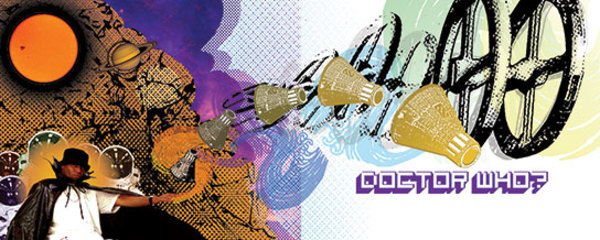Kool Keith: Doctor Who?
If you are Keith Thornton, sometimes even an interview is an exercise in role-playing. At […]
Kool Keith: Doctor Who?
If you are Keith Thornton, sometimes even an interview is an exercise in role-playing. At […]

If you are Keith Thornton, sometimes even an interview is an exercise in role-playing. At least this is the impression I get on the phone with the man who’s rapped under a variety of assumed names over the past two decades, including Dr. Dooom and Dr. Octagon, but most frequently Kool Keith. As he rambles on for close to an hour about aliens and government conspiracies, the division between the real man and his various sci-fi hip-hop personas melts further and further away–an ambiguity Thornton cultivates and willingly exploits.
I interviewed Keith just before The Return Of Dr. Octagon–the sequel to his 1996 cult classic album, Dr. Octagon (re-released as Dr. Octagonecologyst)–had been officially announced, and right before his April full-length, Nogatco Rd.–recorded under the alias Mr. Nogatco (as in, Octagon spelled backwards)–was about to drop. The premise of the latter–Kool Keith’s rigid search for evidence of alien landings and abductions across the landscape of rural America–was still fresh in Thornton’s mind; it’s a theme he’s returned to throughout his career. The enhanced Nogatco Rd. CD packs an original short film starring Thornton and his investigative partner, outfitted in twin full-body chemical radiation suits, dissecting rail-thin midget aliens. Though the production seems intentionally campy–the laboratory scenes are filmed in crackly, Frankenstein-esque black and white and the shots of aliens dismounting their ships sport laughably low-budget special effects–Thornton backs up the pretense with an earnestness that borders on delusional. According to him, aliens exist; moreover, he can prove it.
“I have the actual bones–the skeleton bones–of an alien head in my house,” he confesses in a whisper. “We felt cactus plants (at a landing site) in Phoenix, [Arizona], and I got a gum-like material on my fingers. It burnt.”
Serious sci-fi heads may not find this hard to swallow. The rest of us might feel more comfortable filing Mr. Nogatco’s claims alongside those of his many other “concept albums.” Though he’s been widely recognized as the pioneer of role-playing rap, he is unwilling to talk about himself as an actor, offering no easy answers about where Keith Thornton ends and his aliases begin. But the best performers truly buy into the characters they play, and Thornton’s ability to do so–or perhaps, conversely, his inability to distinguish between his real self and the characters he plays–is what sets him apart as one of the greatest conceptual rapper of all time.
Such façades are not easily cultivated. Thornton began his career as a member of the Ultramagnetic MCs, a lyrically abstract Bronx-based group formed in 1984. The trio made no secret of Thornton’s history as a psychiatric patient at New York City’s Bellevue hospital, where he was treated for depression; in fact, they used the information freely to inflate his reputation as an unstable character.
Erotic Man, his first solo album as Kool Keith, was released in 1996 (the same year as Dr. Octagon). It found Thornton trumpeting yet another fringe genre–pornographic rap–though it was his 1997 follow-up, Sex Styles, that would become the much-lauded flagship of the niche. The highly explicit (some might say freaky) descriptions of sex and foreplay had little to do with Dr. Octagon’s fantastical depictions of outer space and the future, but the projects did share one common thread: Thornton’s extensive, if not tangential, exploration of a specified subject matter over the course of an album.
“Because I have a lot of [material], I do little things to warm up my mind,” says Thornton, who has released more than 30 albums over the course of his career. “I take a (character) part and do research for a month or so to get into something. I have different sessions, like I might do curse styles: I’ll just curse all night–make myself spit the most get-off-my-chest things.”
On The Return of Dr. Octagon, Thornton throws himself once again into the role of the Octagonecologyst, a physician with prophetic insights into mankind’s future–and its sometimes surrealistically futuristic present. “Ants,” for example, is a literal birds-eye perspective of a society that has sublimated human existence with the uniformity of daily routines. “Aliens” is a lyrically fragmented account of “what we’re gonna do when the aliens get here” and the signs that might warn us of their approach. “The highway that night/The orange beam comin’ down was right/Truck stop/Not a myth/Remember that light,” he flows staccato over an uneasy, carnivalesque tempo augmented by a discordant piano.
The album is woven together more loosely than its predecessor, skimming across concerns as diverse as the world’s dwindling resources (“Trees”) and the possibility of an Illuminati-like omnipotent presence (“Perfect World”). Thornton’s chameleon flow does something to aid those transitions, though–when he narrates a cartoonish car chase in an eerie, backroads growl over the country twang of “A Gorilla Driving A Pick-Up Truck” (a wildly different tone from his club holler on “Al Green”), The Return definitely feels like a chorus of voices from a doctor who, over the years, has gone a little schizophrenic.
More than ever, we’re given the feeling that perhaps average folk aren’t meant to understand exactly where Thornton is coming from–we should simply feel lucky to have been invited to his party. Like any true recluse, Thornton says the work he’s most proud of has yet to be released and may, in fact, never make its way to the public. “I have certain songs I wrote that I won’t put out yet because they are too beyond the average human mind,” he says. “The average human mind couldn’t relate to it at all.”

